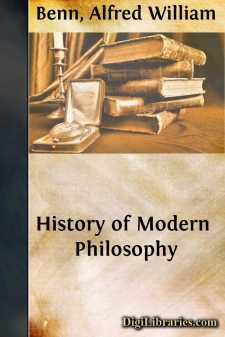Categories
- Antiques & Collectibles 13
- Architecture 36
- Art 48
- Bibles 22
- Biography & Autobiography 813
- Body, Mind & Spirit 142
- Business & Economics 28
- Children's Books 17
- Children's Fiction 14
- Computers 4
- Cooking 94
- Crafts & Hobbies 4
- Drama 346
- Education 46
- Family & Relationships 57
- Fiction 11829
- Games 19
- Gardening 17
- Health & Fitness 34
- History 1377
- House & Home 1
- Humor 147
- Juvenile Fiction 1873
- Juvenile Nonfiction 202
- Language Arts & Disciplines 88
- Law 16
- Literary Collections 686
- Literary Criticism 179
- Mathematics 13
- Medical 41
- Music 40
- Nature 179
- Non-Classifiable 1768
- Performing Arts 7
- Periodicals 1453
- Philosophy 64
- Photography 2
- Poetry 896
- Political Science 203
- Psychology 42
- Reference 154
- Religion 513
- Science 126
- Self-Help 84
- Social Science 81
- Sports & Recreation 34
- Study Aids 3
- Technology & Engineering 59
- Transportation 23
- Travel 463
- True Crime 29
History of Modern Philosophy
Description:
Excerpt
Chapter I.
For a thousand years after the schools of Athens were closed by Justinian philosophy made no real advance; no essentially new ideas about the constitution of nature, the workings of mind, or the ends of life were put forward. It would be false to say that during this period no progress was made. The civilisation of the Roman Empire was extended far beyond its ancient frontiers; and, although much ground was lost in Asia and Africa, more than the equivalent was gained in Northern Europe. Within Europe also the gradual abolition of slavery and the increasing dignity of peaceful labour gave a wider diffusion to culture, combined with a larger sense of human fellowship than any but the best minds of Greece and Rome had felt. Whether the status of women was really raised may be doubted; but the ideas and sentiments of women began to exercise an influence on social intercourse unknown before. And the arts of war and peace were in some ways almost revolutionised.
This remarkable phenomenon of movement in everything except ideas has been explained by the influence of Christianity, or rather of Catholicism. There is truth in the contention, but it is not the whole truth. The Church entered into a heritage that she did not create; she defined and accentuated tendencies that long before her advent had secretly been at work. In the West that diffusion of civilisation which is her historic boast had been begun and carried far by the Rome whence her very name is taken. In the East the title of orthodox by which the Greek Church is distinguished betrays the presence of that Greek thought which moulded her dogmas into logical shape. What is more, the very idea of right belief as a vital and saving thing came to Christianity from Platonism, accompanied by the persuasion that wrong belief was immoral and its promulgation a crime to be visited by the penalty of death.
Ecclesiastical intolerance has been made responsible for the speculative stagnation of the Middle Ages, and it has been explained as an effect of the belief in the future punishment of heresy by eternal torments. But in truth the persecuting spirit was responsible for the dogma, not the dogma for persecution. And we must look for the underlying cause of the whole evil in the premature union of metaphysics with religion and morality first effected by Plato, or rather by the genius of Athens working through Plato. Indeed, on a closer examination we shall find that the slowing-down of speculation had begun long before the advent of Christianity, and coincides with the establishment of its headquarters at Athens, where also the first permanent schools of philosophy were established. These schools were distinctly religious in their character; and none was so set against innovation as that of Epicurus, falsely supposed to have been a home of freethought. In the last Greek system of philosophy, Neo-Platonism, theology reigned supreme; and during the two and a-half centuries of its existence no real advance on the teaching of Plotinus was made....


